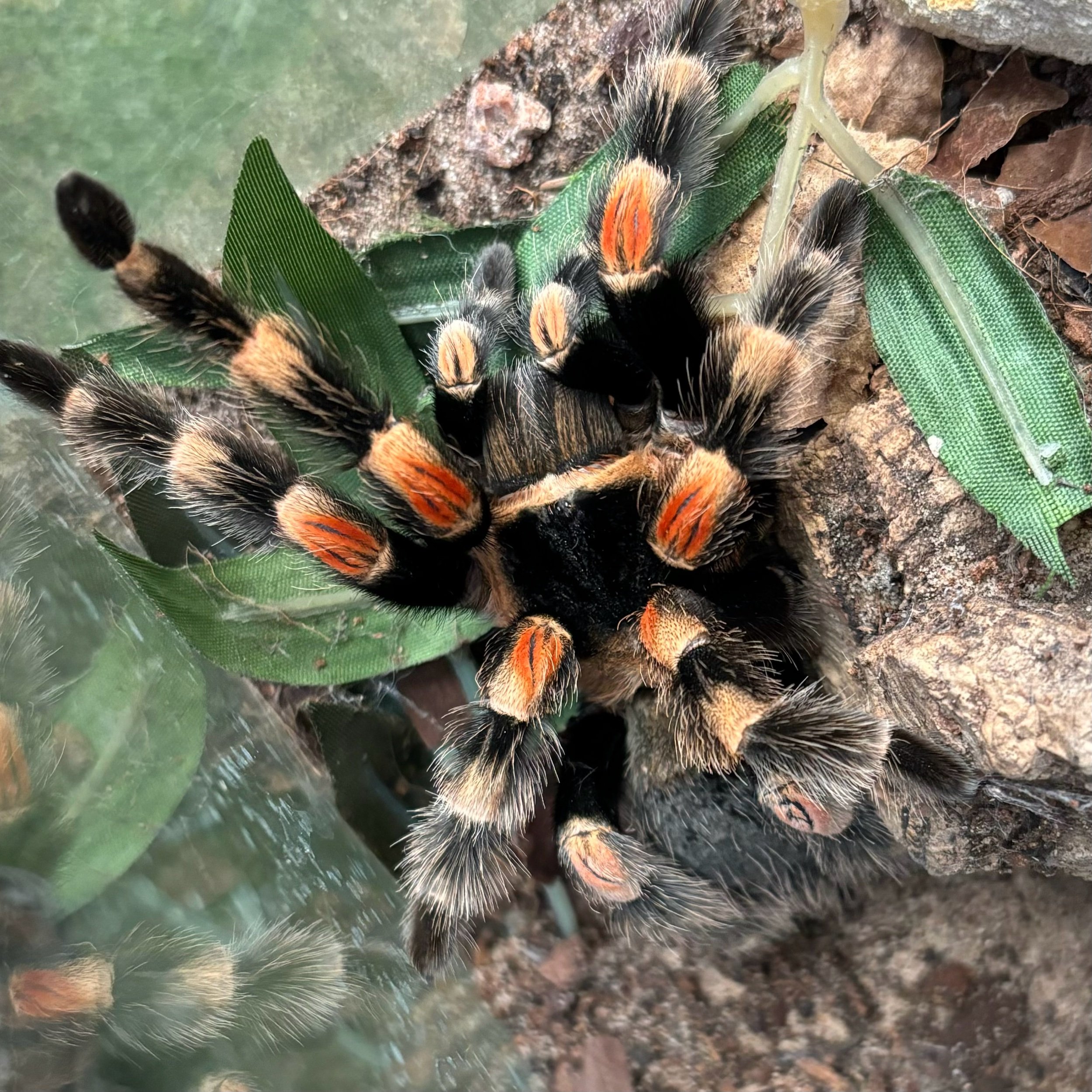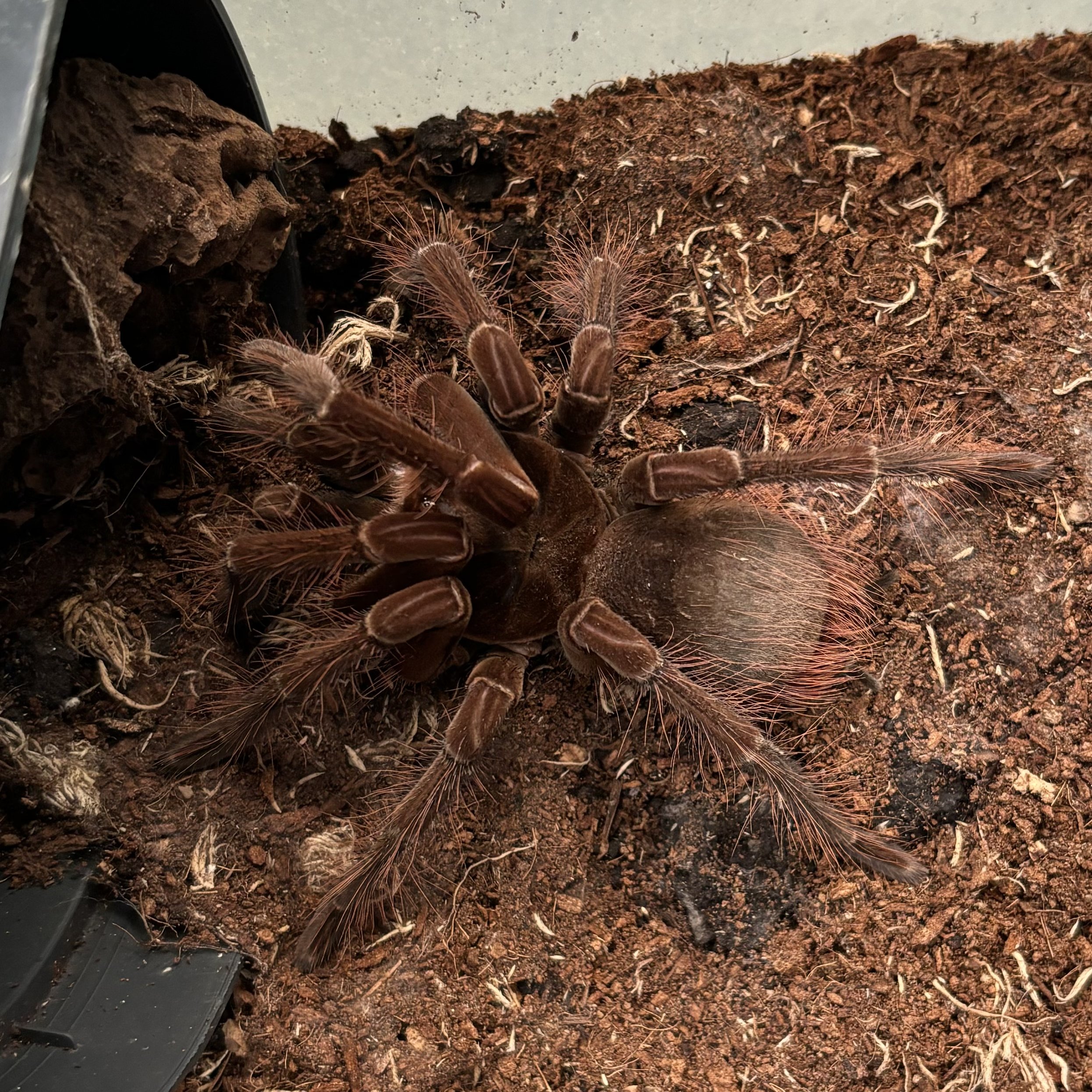Orange Baboon Tarantula For Sale
Tarantulas are amazing pets and surprisingly easy to care for!
Currently for sale in our Iver reptile shop
Photos taken February 2024
Sex: Unsexed
Suitable for: intermediate keepers aware of this species ferocity.
Captive bred? Yes
Handling: we don’t advise handling tarantulas, even more so with this species nick named the Orange Bitey Thing! This species will defend itself with its impressive fangs over kicking hairs.
Size range: as adult 5-6 inches, currently around 3 inch
Housing and habitat: a plastic or glass terrarium with a deep substrate. Warm room temperature around 23-25*C is ideal, heat mats can be used to help provide this heat if keeping in a cooler house.
Feeding is done based off of the animals appearance, generally checking twice a week on their abdomen - if it’s grape shape that’s perfect! Thinner and they may need feeding and circular could suggest they’ve got enough to last in for now.
They eat a range of different prey items, all available in store, such as locusts, crickets, Dubai roaches and much more.
For water we advise spraying a small section of the tank consistently. You won’t want to make puddles but a quarter of the tank should be nice and moist. This allows your animal to chose their desired humidity and drink when thirsty.
Some larger tarantulas can use water bowls however drinking from the soil works well and avoids risks of the animals drowning.
Tarantulas are amazing pets and surprisingly easy to care for!
Currently for sale in our Iver reptile shop
Photos taken February 2024
Sex: Unsexed
Suitable for: intermediate keepers aware of this species ferocity.
Captive bred? Yes
Handling: we don’t advise handling tarantulas, even more so with this species nick named the Orange Bitey Thing! This species will defend itself with its impressive fangs over kicking hairs.
Size range: as adult 5-6 inches, currently around 3 inch
Housing and habitat: a plastic or glass terrarium with a deep substrate. Warm room temperature around 23-25*C is ideal, heat mats can be used to help provide this heat if keeping in a cooler house.
Feeding is done based off of the animals appearance, generally checking twice a week on their abdomen - if it’s grape shape that’s perfect! Thinner and they may need feeding and circular could suggest they’ve got enough to last in for now.
They eat a range of different prey items, all available in store, such as locusts, crickets, Dubai roaches and much more.
For water we advise spraying a small section of the tank consistently. You won’t want to make puddles but a quarter of the tank should be nice and moist. This allows your animal to chose their desired humidity and drink when thirsty.
Some larger tarantulas can use water bowls however drinking from the soil works well and avoids risks of the animals drowning.
Tarantulas are amazing pets and surprisingly easy to care for!
Currently for sale in our Iver reptile shop
Photos taken February 2024
Sex: Unsexed
Suitable for: intermediate keepers aware of this species ferocity.
Captive bred? Yes
Handling: we don’t advise handling tarantulas, even more so with this species nick named the Orange Bitey Thing! This species will defend itself with its impressive fangs over kicking hairs.
Size range: as adult 5-6 inches, currently around 3 inch
Housing and habitat: a plastic or glass terrarium with a deep substrate. Warm room temperature around 23-25*C is ideal, heat mats can be used to help provide this heat if keeping in a cooler house.
Feeding is done based off of the animals appearance, generally checking twice a week on their abdomen - if it’s grape shape that’s perfect! Thinner and they may need feeding and circular could suggest they’ve got enough to last in for now.
They eat a range of different prey items, all available in store, such as locusts, crickets, Dubai roaches and much more.
For water we advise spraying a small section of the tank consistently. You won’t want to make puddles but a quarter of the tank should be nice and moist. This allows your animal to chose their desired humidity and drink when thirsty.
Some larger tarantulas can use water bowls however drinking from the soil works well and avoids risks of the animals drowning.






